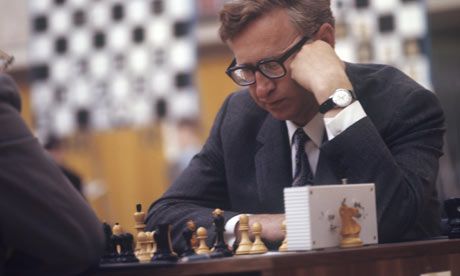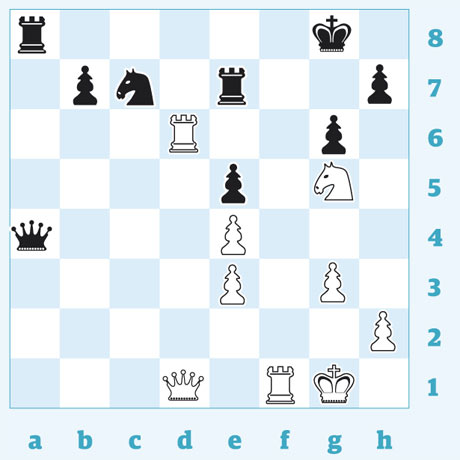The Outside Pawn

Go to Blogger edit html and find these sentences.Now replace these sentences with your own descriptions.This theme is Bloggerized by Lasantha Bandara - Premiumbloggertemplates.com.
Go to Blogger edit html and find these sentences.Now replace these sentences with your own descriptions.This theme is Bloggerized by Lasantha Bandara - Premiumbloggertemplates.com.
Go to Blogger edit html and find these sentences.Now replace these sentences with your own descriptions.This theme is Bloggerized by Lasantha Bandara - Premiumbloggertemplates.com.
Go to Blogger edit html and find these sentences.Now replace these sentences with your own descriptions.This theme is Bloggerized by Lasantha Bandara - Premiumbloggertemplates.com.
Go to Blogger edit html and find these sentences.Now replace these sentences with your own descriptions.This theme is Bloggerized by Lasantha Bandara - Premiumbloggertemplates.com.
Home » Archives for March 2010




With the approaching Anand - Topalov World Chess Championship match, the media in Bulgaria is becoming more and more active. The top notch information last week came from an interview with Silvio Danailov by Antoni Jordanov for Trud (the second largest daily in the country with 500 000 readers). Danailov speaks about politics, Magnus Carlsen, the coming World Chess Championship, Vishy Anand and his secret seconds, the preparation of Veselin Topalov at Canary Islands, and confirms what has been rummored for a while - Mtel Masters 2010 will take a break and will not happen this year.Mr. Danailov, why do you want to become the president of European chess?
The ECU is respectable institution and has potential, because it has 54 member states. People from other countires initiated talks with me, these people want ECU to be headed by someone with professionalism and new ideas. Up until now I have been more of a businessman in chess, now there is a need to do politics.Are the elections predominantly based on politics or is it a question of ideas?
I have no experience in politics, but others convinced me that I can do it and with the right strategy can achieve good results. The people in chess know very well what each candidate can bring. The elections will be based on a mixture of politics and vision. It is believed that my opponent will be Ali Nihat Yazici from Turkey, who has his own lobby. The fight will be challenging.It seems as if the field you worked in so far is too narrow for you
In my carreer I have practically accomplished everything I have dreamed of. Or even more. No one believed that a Bulgarian man can become world champion – Vesko Topalov and I made it happen. I organized the supertournament “M-tel masters” in Sofia and introduced the Sofia rules worldwide; along with some friends we created the “Grand Slam” in Chess. In this way my professional career reached its ceiling. I did not give thought to this move, but the challenge is big. Also, people convinced me that I am the right figure. So, I am entering politics. Chess politics.There is another ceiling – President of FIDE
No, no, while Kirsan Ilyumzhinov is the leader of FIDE, it would not cross my mind. After that, I do not know. In chess we are accustomed to play move by move and not to rush things. Because rushed action lead to wrong decisions. So, let these elections pass first. If I succeed, it will be prestigious for Bulgaria as well.There will also be the election of FIDE President – between Ilymzhinov and and Karpov
It is very intriguing. Now everyone awaits with interest who is the Russian Federation going to support because this will, to a large extent, determine the favorite to win. But no matter what happens, every one of them has his advantages. Ilymzhinov is already 15 years excelent President, doing a lot of things for chess, but Karpov is an extremely dangerous opponent as a politician – very intelligent and swift.They are both wealthy. Is money going to play?
In elections money always comes into play.And in your case?
My advantages are a professional career, the results, and the ideas. The candidate from Turkey has experience in politics, after all he is vice President of FIDE. I do not know whether he is wealthy, but I am aware that he has strong back up from Turkey. Because this is part of the government strategy of European community integration for the future.Lets talk about the Topalov - Anand Match. What is new from Spain – both Topalov and you are there?
Vesko is preparing at the Canary Islands, his preparation is going according to schedule and there is nothing out of the ordinary.Aren’t you concerned by the form of his second Ivan Cheparinov, who performed poorly on the EICC?
Of course I am concerned, It would have been much better for him to have finished with better results and to be more motivated. Then the sentiment would have been better. Nevertheless, I hope that Ivan is a professional and since he has always had great ideas, now will be the same. Let us not forget that Vesko has also undergone such dark periods. It happens to every sports person and one should not fall into despair.And what about the shape of Vesko, do you have any concerns?
Naturally, I am concerned, but we are doing everything we can to reach our goal. The rest is destiny.
How are you going to comment on the performance of the Bulgarians on the EICC, where among the men all our representatives are ranked below 70th place?
Chess is not much more different from the rest of the sports, and as everywhere else there are declines in chess as well. I expected much more from Cheparinov, for the rest I am not surprised. However, I am pleased by Kiprian Barbatov - he has a lot to learn, but is on the right track. We, the federation, and me personally, are doing whatever we can. Maybe we will include him in the team for the Chess Olympiad in Khanty Mansiysk.Is the gap between Topalov and the rest [of the Bulgarian players] becoming too large?
Topalov is a phenomenon, it is very hard to compare the others to him. The same is the case in India with Anand and the rest of the chess players.What does the intelligence on Anand bring – can he surprise Vesko and you?
There can always be surprise – chess is developing with a fast pace, computers help, newer and newer versions are created. He might surprise us with the choice of seconds. For now they are clear. We know that he is in the midst of hard preparation, nothing else. With him, everything is a deep secret. He has made no public announcement and has not shown on public places, only at the Bundesliga and Corus in January. However, at both places he was obviously saving himself and did not show anything special. Anand will have less psychological pressure in Sofia. And it is natural that everyone in Bulgaria expects Vesko to win.How are you going to evaluate another duo – Magnus Carlsen and Gary Kasparov, with which you might clash someday?
They have accomplished outstanding results, but have recently split for some reason - I am not aware which, but it is good for us. I am content from professional point of view because this duo was a killer one. Carlsen is dangerous to everyone, but it is one thing to have Carlsen with Kasparov and another thing to have Carlsen without him.It is already clear that there is not going to be a supertournament Mtel Masters?
We discussed extensively the idea with the sponsor, since the deadlines did not allow us to organize two big tournaments for such a short period of time – the match with Anand and Mtel Masters.
One of the explanations was that the match with Anand will generate great interest and the tournament will fade away. I did not share this opinion and believe that it is quite the contrary – the popularity of chess after the match would have been greater and the tournament could only benefit from it. Nevertheless, the sponsor decided and they chose not to have Mtel Masters this year, they will only sponsor Topalov personally during the match.Isn't this going to eventually have a repercussion on the reputation of the tournament for the coming year?
It will have a repercussion, but in history there have been such cases with other tournaments – both with Corus and Linares.But also you are falling in a uncomfortable situation as ideologist and creator of the Grand Slam, part of which is Mtel Masters.
Yes, it is not pleasant. But, regretfully, now there is nothing more to be done. There is a temporary crisis, the same in the rest of the world. Chess, after all, is not such an expensive sport and I hope that next year there will be no longer problems



He is truth in chess! Smyslov plays correctly, truthfully and has a natural style. By the way, why do you think he lacks that aura of mystique like Tal or Capablanca? Because Smyslov is not an actor in chess, his play is neither artistic nor fascinating. But I am fond of his style. I would recommend a study of Smyslov’s games to children who want to know how to play chess because he plays the game how it should be played: his style is the closest to some sort of ‘virtual truth’ in chess. He always tried to make the strongest move in each position. He has surpassed many other of the World Champions in the number of strongest moves made. As a professional, this skill impresses me. I know that spectators are more interested in flaws … ups and downs. But from the professional standpoint, Smyslov has been underestimated.
My study of chess was accompanied by a strong attraction to music, and it was probably thanks to this that from childhood I became accustomed to thinking of chess as an art, and have never regarded it as anything else, for all the science and sport involved in it. And, moreover, an art which in some ways is closer to music than it is customary to think. Perhaps chess and music are drawn together by laws of harmony and beauty which are difficult to formulate and difficult to grasp, or perhaps by something else.

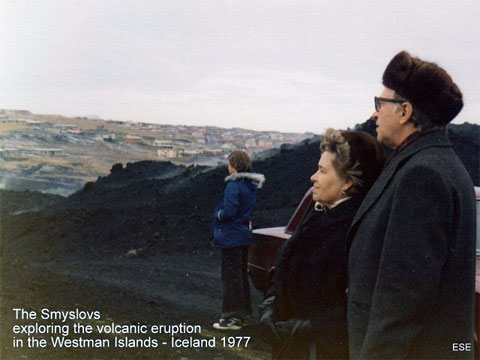
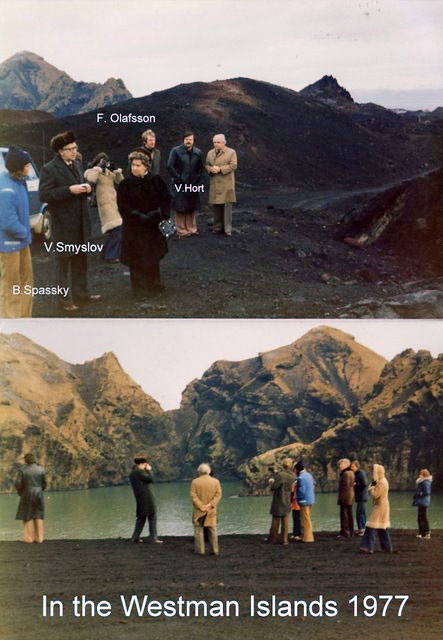

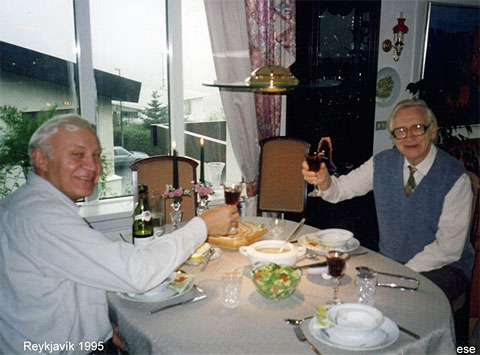
My study of chess was accompanied by a strong attraction to music, and it was probably thanks to this that from childhood I became accustomed to thinking of chess as an art, and have never regarded it as anything else, for all the science and sport involved in it. And, moreover, an art which in some ways is closer to music than it is customary to think. Perhaps chess and music are drawn together by laws of harmony and beauty which are difficult to formulate and difficult to grasp, or perhaps by something else.
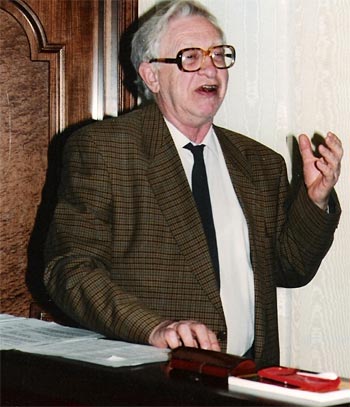
Stenka Razin sailing in the Caspian Sea (painting by Vasily Surikov in the
Russian Museum, St Petersburg)
| Russian | Transcription | English |
| Из-за острова на стрежень, На простор речной волны, Выплывают расписные, Острогрудые челны. | Iz-za ostrova na strezhen', Na prostor rechnoy volny, Vyplyvayut raspisnye, Ostrogrudye chelny. | From beyond the wooded island To the river wide and free Proudly sailed the arrow-breasted Ships of Cossack yeomanry. |
| На переднем Стенька Разин, Обнявшись, сидит с княжной, Свадьбу новую справляет, Сам веселый и хмельной. | Na perednem Sten'ka Razin, Obnyavshis', sidit s knyazhnoy, Svad'bu novuyu spravlyaet, Sam veselyi i khmel'noy. | On the first is Stenka Razin With his princess by his side Drunken holds in marriage revels With his beauteous young bride |
| Позади их слышен ропот: Нас на бабу променял! Только ночь с ней провозился Сам наутро бабой стал . . . . | Pozadi ikh slyschen ropot: Nas na babu promenyal! Tol'ko noch' s nej provozilsja Sam nautro baboy stal . . . . | From behind there comes a murmur "He has left his sword to woo; One short night and Stenka Razin Has become a woman, too." |
| Этот ропот и насмешки Слышит грозный атаман, И могучею рукою Обнял персиянки стан. | Etot ropot i nasmeshki Slyshit groznyi ataman, I mogucheju rukoju Obnjal persijanki stan. | Stenka Razin hears the murmur Of his discontented band And his lovely Persian princess He has circled with his hand. |
| "Волга, Волга, мать родная, Волга, русская река, Не видала ты подарка От донского казака! | "Volga, Volga, mat' rodnaya, Volga, russkaya reka, Ne vidala ty podarka Ot donskovo kazaka! | Volga, Volga, Mother Volga Wide and deep beneath the sun, You have never seen such a present From the Cossacks of the Don. |
| Мощным взмахом поднимает Он красавицу княжну И за борт ее бросает В набежавшую волну. | Moshchnym vzmakhom podnimaet On krasavitsu knyazhnu I za bort eyo brosaet V nabezhavshuyu volnu. | Now, with one swift mighty motion He has raised his bride on high And has cast her where the waters Of the Volga roll and sigh. |

Timur Gareyev captures JNBS UWI MastersBy Zachary Ramsay, UWI Chess SocietyUzbek grandmaster Timur Gareyev from the University of Texas in Brownsville completed his domination of the JNBS UWI Masters when he defeated Jamaican FIDE Master Jomo Pitterson at the Assembly Hall, University of the West Indies Mona, Jamaica. He collected a total of eight points from nine games, thus gaining the title of Caribbean Collegiate Champion.  David Mullings, Manager of eChannels and Discount Business of the Jamaica National Building Society, makes the first move on the game between GM Gareyev (right) and IM Margvelashvili (left), while Dr. Thelora Reynolds, the Director of Student Services (UWI, Mona) looks on 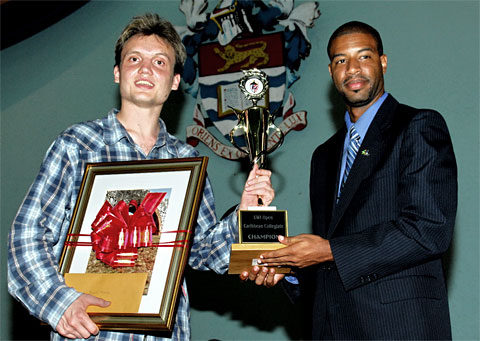 Gareyev (left) collects his prize for Caribbean Collegiate Champion from David Mullings, Manager of eChannels and Discount Business of the Jamaica National Building Society GM elect Giorgi Margvelashvili from the University of Maryland in Baltimore County, and IM Marko Zivanic from the University of Texas in Dallas followed in second and third place respectively, with 7.5 and 6.5 points. National Master Shane Matthews of Jamaica, placed an impressive fourth, after securing a well-fought draw with IM Margvelashvili. 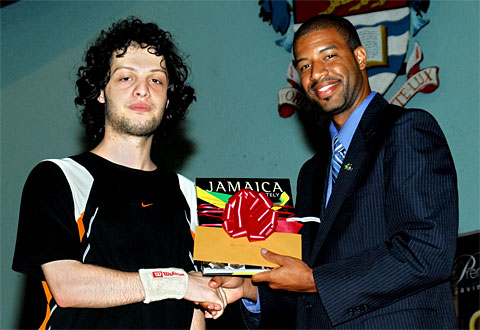 IM Margvelashvili (left) collects his prize for second place
Marcus Joseph, the National Champion of Trinidad and Tobago and a student of the UWI St. Augustine campus, made an exciting comeback when he defeated both Jamaica’s top players, FM Warren Elliott and Swedish FM Bengt Hammar. 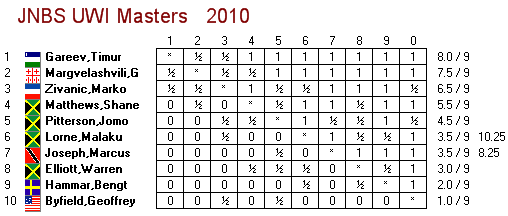 Daren Wisdom captured the UWI Open Championship, after placing ahead of National Master Mark Holness on tiebreak, after both had finished on five points. UWI’s National Master Damion Davy, captured third place in the UWI Open Championship with 4.5 points, after splitting the point in a very close encounter with long-time rival National Master Russell Porter. 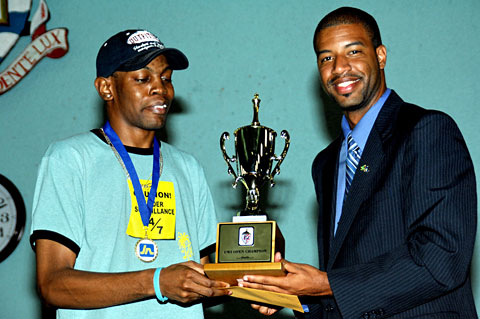 Daren Wisdom (left) is the UWI Open Champion 2010 In other sections, over two hundred participants sparred for the sectional titles. Lawrence Foreman and Justin Lowe won the Under 12 section, while Shreyas Smith captured the Under 16 section, all on perfect scores. Rachel Miller, Elias Issa and Aldeam Facey were victorious in the Beginners section.
Chancellor Hall (UWI), led by National Master Damion Davy, dominated the Inter-hall Chess Competition, when they flanked Rex Nettleford Hall 3-0 in the finals; this after turning back top seeds Preston Hall. 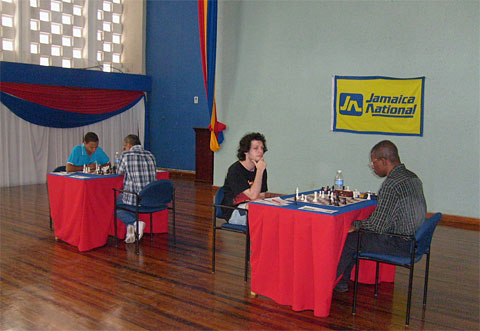 Marcus Joseph, the National Champion of Trinidad and Tobago (far left) tackles National Master Shane Matthews of Jamaica, while National Master Geoffrey Byfield (far right) puts up a fight against International Master Margvelasvhili 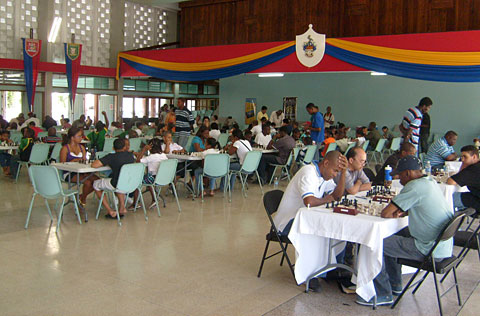 The Open Sections, in which over 200 participants in age groups and skill levels The tournament was organized by the UWI Chess Society, of the University of the West Indies Mona, Jamaica; and was designed to promote chess both at the university and national level. President of the UWI Chess Society, Zachary Ramsay said he was “proud of the involvement of the young chess players” and sees the second staging of this tournament as being in keeping with the mandate of the Society as they seek to incorporate chess into the culture of the University and improve the intellectual drive and capacity of its students while striving to challenge a new generation of Caribbean chess players. 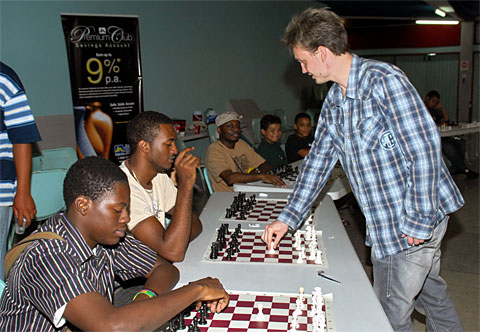 GM Timur Gareyev gives a simultaneous exhibition Part of the proceeds from the event will be donated to the improvement of the National Children's Home, the Society’s outreach project. The event was sponsored by the Office of the Principal, UWI, Mona, The Jamaica National Building Society (JNBS), American Airlines, The Gleaner, National Commercial Bank, Pages Café and Supreme Ventures. 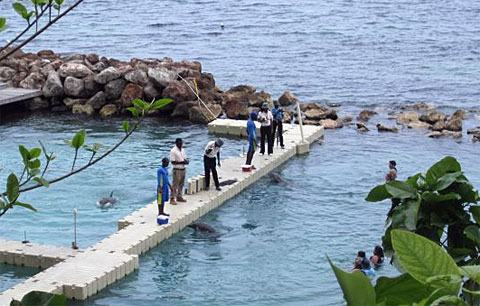 Dolphin Cove, Ocho Rios, another popular tourist attraction that the participants visited; guests have the opportunity to swim with and touch dolphins
 International participants enjoying a drink of coconut water 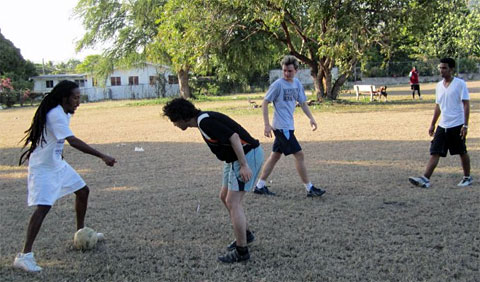 NM Malaku Lorne displaying his fancy footwork in a recreational football game Video impressions of the eventAbout the University of the West Indies MonaThe University of the West Indies at Mona, Jamaica was established in 1948 as a college of the University of London. It gained full University status in 1962. The Mona Campus, located in Northern Kingston, encompasses 653 acres of land formerly part of two large sugar estates, Papine and Mona. Scattered throughout the campus are the famous historic ruins of a Roman-style aqueduct, water wheel, and other remnants of the sugar works which once stood on the site. Arial view of Mona Campus – explore in the above frame or in a larger map The campus is nestled in a lush valley embraced by Long Mountain to the south and the southernmost peaks of the famous Blue Mountain Range to the North. Mona is perhaps one of the most scenic areas in Greater Kingston, with the surrounding mountains providing a verdant backdrop which enhances the serene atmosphere of the campus. 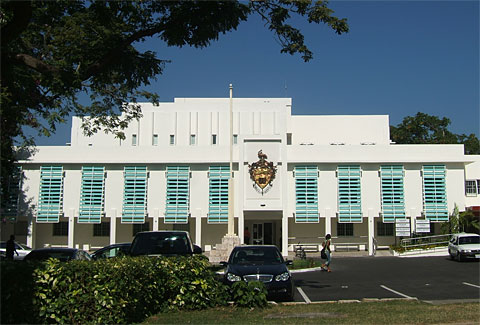 The Annex building at the University of the West Indies Mona 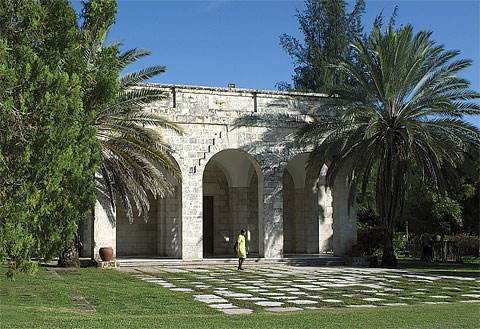 The Chapel at the University, which displays beautiful historic architecture |

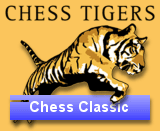 | Chess Classic Mainz 2010 – Back to the roots"Making a virtue out of necessity" is the central theme of the 17th Chess Classic Mainz. From 06 – 08 August 2010 the major international rapid chess event in the world will be played in Mainz. The Chess Tigers would have loved to present a whole week of top level chess in all its beauty and diversity, as we did in previous editions, but in this difficult economic times many companies do not have the financial resources anymore to to support sport events. |
Women's and Chess960 world champion Alexandra Kosteniuk
The main sponsor Wolfgang Grenke, CEO of Grenke Leasing,
with World Champion Viswanathan Anand
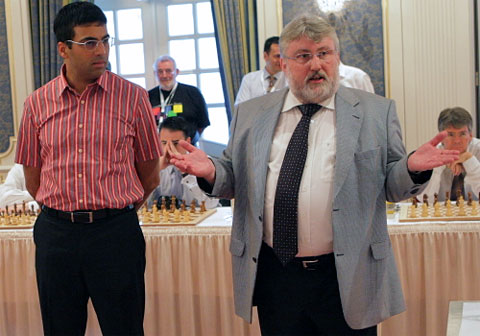
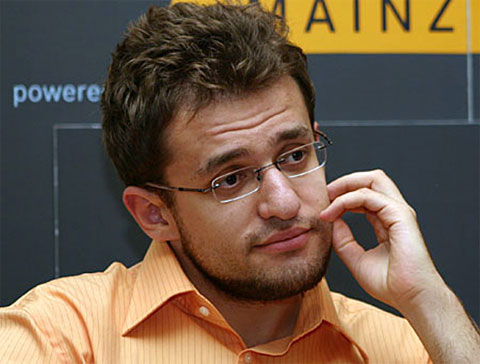
World-class GM Shakhriyar Mamedyarov from Azerbaijan

